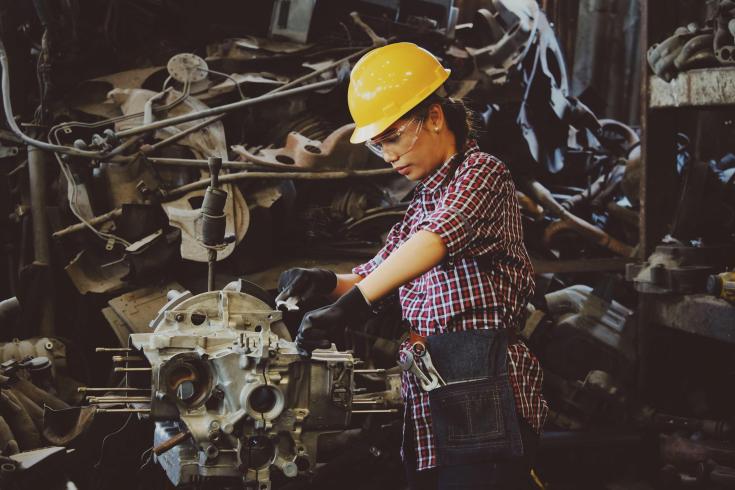Green Skills & Our 2nd Coffee Break Workshop
In December, COMMIT held its second Coffee-Break Workshop (CBW), shining a spotlight on widening participation in green skills by expanding opportunities for a diverse workforce! Project partners, local stakeholders and enthusiastic attendees explored ways to improve access to green skills, setting the stage for an exciting 2025 focused on advancing skills, finance, and innovation for SME transitions.
Here's a snapshot of the session:
1. Green transition skill development within the EU
Eléna Jabri (EPRC) opened the workshop with a powerful reminder: achieving climate and Net Zero goals is impossible without green jobs. Although she warned that the green transition risks exacerbating inequalities unless it actively includes marginalised groups.
Green skills - ranging from technical (e.g., renewable energy systems) to transformative (e.g. understanding power structures) - are fundamental for a sustainable future. Yet, barriers to access persist for groups such as women, low-skilled workers, youth, and rural communities.
What are strategies to bridge these gaps?
- Empowering women through access to STEM education and structural support.
- Guiding youth, especially those not in education, with mentorship and career advice.
- Adapting workplaces for persons with disabilities.
- Supporting rural communities and migrants with localised, accessible training and credential recognition.
Eléna underscored the role of EU initiatives like the European Green Deal, the Just Transition Fund and the Net-Zero Industry Act in financing lifelong learning, promoting regional innovation, and encouraging cross-sector collaboration.
2. Designing Soft Skills and Vocational Training Courses
How can training programmes help people thrive in green jobs?
Gabriela Kacheshmarova (SZ REDA) shared an exciting initiative, “Monitor, Survey, Act,” which unites regions like Stara Zagora (Bulgaria), Centru (Romania), and Western Macedonia (Greece) to assess labour market needs and design practical training courses.
The programme, aimed at groups including self-employed and long-term unemployed individuals and vulnerable populations, offers courses combining:
- Technical skills: land restoration, photovoltaic systems, and innovative agriculture methods.
- Soft skills: innovation management, entrepreneurship, commercialisation and digital tools for energy transition.
With 300 stakeholders expected, engagement is key, as highlighted by Gabriela Kacheshmarova's anecdotes, including Facebook campaigns targeting older participants in Bulgaria.
3. Networking and Skill Development in Just Transition Areas
How can local businesses help build the green skills their communities need?
Evi Zountouriadou (Eordea Municipality) presented Western Macedonia’s skill development workshop, a project connecting businesses with local talent. Through collaborative efforts with organisations, academia and various government levels, the initiative provides specific training in green skills while breaking down resistance to change.
Key components include:
- Local labour market matching: connecting businesses with skilled professionals to boost competitiveness.
- Green skills development: exploring innovative training for renewable energy and sustainability jobs.
- Collaboration and employability: providing a platform for networking between local businesses and professionals.
4. Women in Technics for the IJmond
How can we encourage more women to pursue careers in technical fields?
Sabine van Knijff (Women in Technics) brought energy and passion to her presentation about the Women in Technics initiative in the Netherlands. This important project addresses two pressing challenges:
- A shortage of technical personnel in industrial sectors.
- The underrepresentation of women, who make up 50% of the population yet remain vastly outnumbered in technical fields.
The initiative’s DevelopHER Academy trains women for technical careers while ensuring their success through supportive features like:
- Personalised coaching and small class sizes help nurture confidence, while matching each woman with the right technical partner through psychological profiles.
- Tackling unconscious bias by using software tools to raise awareness and making necessary adjustments, like adding women’s restrooms in industrial settings.
- Ensuring women are placed in long-term technical roles that match their new skills and secure future job opportunities.
What truly stands out about this initiative is its thoughtful, proactive and diversified recruitment strategy. With a mix of outreach campaigns, social media (Facebook and LinkedIn), and targeted activities in places like malls, schools, and gyms, the programme is designed to reach women from all walks of life, including non-technical fields.
Interested in further knowledge exchanges to enrich policies that improve SME access for the transition? Follow COMMIT on social media and explore the COMMIT library!

